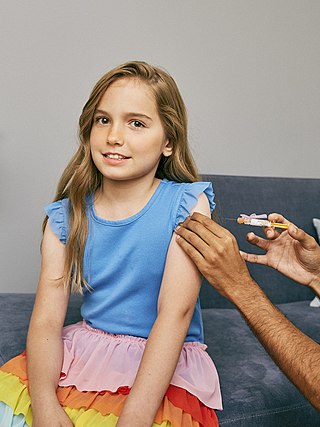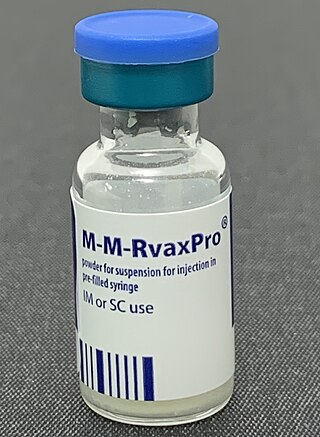
Vaccination is the administration of a vaccine to help the immune system develop immunity from a disease. Vaccines contain a microorganism or virus in a weakened, live or killed state, or proteins or toxins from the organism. In stimulating the body's adaptive immunity, they help prevent sickness from an infectious disease. When a sufficiently large percentage of a population has been vaccinated, herd immunity results. Herd immunity protects those who may be immunocompromised and cannot get a vaccine because even a weakened version would harm them. The effectiveness of vaccination has been widely studied and verified. Vaccination is the most effective method of preventing infectious diseases; widespread immunity due to vaccination is largely responsible for the worldwide eradication of smallpox and the elimination of diseases such as polio and tetanus from much of the world. According to the World Health Organization (WHO), vaccination prevents 3.5–5 million deaths per year. A WHO-funded study by The Lancet estimates that, during the 50-year period starting in 1974, vaccination prevented 154 million deaths, including 146 million among children under age 5. However, some diseases have seen rising cases due to relatively low vaccination rates attributable partly to vaccine hesitancy.

The MMR vaccine is a vaccine against measles, mumps, and rubella, abbreviated as MMR. The first dose is generally given to children around 9 months to 15 months of age, with a second dose at 15 months to 6 years of age, with at least four weeks between the doses. After two doses, 97% of people are protected against measles, 88% against mumps, and at least 97% against rubella. The vaccine is also recommended for those who do not have evidence of immunity, those with well-controlled HIV/AIDS, and within 72 hours of exposure to measles among those who are incompletely immunized. It is given by injection.

Vaccine hesitancy is a delay in acceptance, or refusal, of vaccines despite the availability of vaccine services and supporting evidence. The term covers refusals to vaccinate, delaying vaccines, accepting vaccines but remaining uncertain about their use, or using certain vaccines but not others. Although adverse effects associated with vaccines are occasionally observed, the scientific consensus that vaccines are generally safe and effective is overwhelming. Vaccine hesitancy often results in disease outbreaks and deaths from vaccine-preventable diseases. Therefore, the World Health Organization characterizes vaccine hesitancy as one of the top ten global health threats.

A vaccination schedule is a series of vaccinations, including the timing of all doses, which may be either recommended or compulsory, depending on the country of residence. A vaccine is an antigenic preparation used to produce active immunity to a disease, in order to prevent or reduce the effects of infection by any natural or "wild" pathogen. Vaccines go through multiple phases of trials to ensure safety and effectiveness.
The MMRV vaccine is a combination vaccine which combines the attenuated virus measles, mumps, rubella, and varicella (chickenpox). The MMRV vaccine has similar immunogenicity and overall safety profiles to the MMR vaccine administered with or without the varicella vaccine. The MMRV vaccine is typically given to children between one and two years of age.
The Joint Committee on Vaccination and Immunisation (JCVI) is an independent expert advisory committee that advises United Kingdom health departments on immunisation, making recommendations concerning vaccination schedules and vaccine safety. It has a statutory role in England and Wales, and health departments in Scotland and Northern Ireland may choose to accept its advice.
Claims of a link between the MMR vaccine and autism have been extensively investigated and found to be false. The link was first suggested in the early 1990s and came to public notice largely as a result of the 1998 Lancet MMR autism fraud, characterised as "perhaps the most damaging medical hoax of the last 100 years". The fraudulent research paper, authored by Andrew Wakefield and published in The Lancet, falsely claimed the vaccine was linked to colitis and autism spectrum disorders. The paper was retracted in 2010 but is still cited by anti-vaccine activists.
A vaccination policy is a health policy adopted in order to prevent the spread of infectious disease. These policies are generally put into place by state or local governments, but may also be set by private facilities, such as workplaces or schools. Many policies have been developed and implemented since vaccines were first made widely available.

Measles vaccine protects against becoming infected with measles. Nearly all of those who do not develop immunity after a single dose develop it after a second dose. When the rate of vaccination within a population is greater than 92%, outbreaks of measles typically no longer occur; however, they may occur again if the rate of vaccination decreases. The vaccine's effectiveness lasts many years. It is unclear if it becomes less effective over time. The vaccine may also protect against measles if given within a couple of days after exposure to measles.
Warnings About Vaccination Expectations NZ (WAVESnz), formerly the Immunisation Awareness Society (IAS), is a New Zealand anti-vaccination lobby group.
The 2012–2013 Swansea measles epidemic began in November 2012 and was declared over on 3 July 2013. There were a total of 1,219 measles notifications in Swansea, Neath Port Talbot, Bridgend, Carmarthenshire, Ceredigion, Pembrokeshire and Powys, with 1,455 measles notifications for the whole of Wales, 664 of which were in Swansea alone. A total of 88 people were hospitalised for measles infection during the epidemic. One death was reported: a 25-year-old man with giant cell pneumonia brought on by measles infection died on 18 April 2013. The cost associated with treating the sick and controlling the outbreak exceeded £470,000 ($701,898).

Measles is extremely contagious, but surviving the infection results in lifelong immunity, so its continued circulation in a community depends on the generation of susceptible hosts by birth of children. In communities which generate insufficient new hosts the disease will die out. This concept was first recognized by Bartlett in 1957, who referred to the minimum number supporting measles as the critical community size (CCS). Analysis of outbreaks in island communities suggested that the CCS for measles is c. 250,000. Due to the development of vaccination against measles, the world has seen a 99% decrease in measles related cases compared cases before the vaccine was developed.
In early months of 2019, a measles outbreak occurred in the Portland metropolitan area, including the Clark County, Washington suburbs, in the United States. At the time, the outbreak was the largest outbreak in more than two decades; outbreaks in 2019 in areas including Brooklyn and Rockland County, New York have since seen far greater numbers of cases.

The 2019 Philippines measles outbreak began in early 2019. An outbreak of measles was officially declared in February 2019 in select administrative regions in Luzon and Visayas including Metro Manila by the Philippine government. The outbreak is attributed to lower vaccination rates, from a high of 88% 10 to 15 years previous to 74% at the time of the outbreak, allegedly caused by the Dengvaxia controversy.

Measles was declared eliminated from the United States in 2000 by the World Health Organization due to the success of vaccination efforts. However, it continues to be reintroduced by international travelers, and in recent years, anti-vaccination sentiment has allowed for the reemergence of measles outbreaks.

The 2019–2020 New Zealand measles outbreak was an epidemic that affected New Zealand, primarily the Auckland region. The outbreak was the worst epidemic in New Zealand since an influenza epidemic in 1999, and is the worst measles epidemic since 1938.

The 2019 Samoa measles outbreak began in September 2019. As of 6 January 2020, there were over 5,700 cases of measles and 83 deaths, out of a Samoan population of 200,874. Over three per cent of the population were infected. The cause of the outbreak was decreased vaccination rates among newly born babies, from 74% in 2017 to 31–34% in 2018, even though nearby islands had rates near 99%.
Nicola Mary Turner is a New Zealand public health advocate who is a Professor at the University of Auckland and Medical Director of the Immunisation Advisory Centre, an organisation that advises the New Zealand medical profession and the New Zealand Government. She has contributed to advisory committees for the New Zealand Ministry of Health, is a spokesperson for the Child Poverty Action Group and works in general practice. Much of her research and outreach has focused on improving immunisation coverage and closing equity gaps for the national schedule vaccine delivery in New Zealand and she has commented publicly on these issues during COVID-19 in New Zealand.
Helen Aspasia Petousis-Harris is a New Zealand vaccinologist and associate professor in the Department of General Practice and Primary Health Care at the University of Auckland. She has been involved in research related to vaccination in New Zealand since 1998, with her main areas of focus being vaccine safety and effectiveness. Petousis-Harris has had a variety of lead roles in New Zealand and international organisations that focus on vaccination and is a regular media spokesperson in this field, especially during the COVID-19 pandemic.

COVID-19 vaccination in New Zealand began on 20 February 2021, and will continue throughout the pandemic with the goal of vaccinating all willing New Zealanders aged 5 or older. Those aged 5 to 11 require a parent, caregiver or legal guardian accompany them to their appointment and provide consent for them to be vaccinated. As of 1 September, anyone in New Zealand, regardless of their immigration status, is eligible to be vaccinated.










